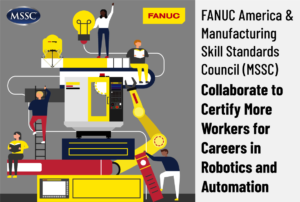It is no secret that employers in the U.S. are facing severe workforce shortages of entry-level workers in all sectors of manufacturing. Advanced manufacturing companies feel this strongly as they find that applicants don’t possess the foundational skills to perform complex robot operation tasks. The rapid expansion of digital technologies in manufacturing makes solving this challenge even more difficult, especially for the robotics industry that is an active user of those technologies
How can CTE solve workforce shortages in robotics?
Career and technical education (CTE) may begin to solve workforce shortages by creating a pipeline of potential candidates with the right skills. Two national leaders in the certification of advanced manufacturing technicians have teamed up to develop a solution. The Manufacturing Skill Standards Council (MSSC) and FANUC America — a provider of automation products — are working together to create a career pathway for emerging robotics technician using stackable credentials.

Participants transition from completion of an MSSC certified production technician (CPT) certification into a FANUC industry training and certification program. The stackability of their respective, industry-recognized certifications presents a viable solution to address acute workforce shortages in robotics across the country.
“The collaboration between FANUC and MSSC will provide a major benefit to employers looking to fill robotics and CNC technical positions,” said Paul Aiello, executive director of education at FANUC America. “We look forward to incorporating the MSSC foundational CPT certification program into our robotics and CNC operator training pathways. And we will encourage our customers to use the CPT certifications as part of their employee training.”
Technological advances drive progress in education.
MSSC recently upgraded its signature CPT program to include a fundamental understanding of Industry 4.0 technologies, which include:
- Artificial intelligence (AI)
- 5G
- 3D printing/ Additive manufacturing
- Industrial internet of things (IIOT)
- Data analytics
- Autonomous robots
- Augmented reality
- Nanomanufacturing
- Advanced materials
Further, future manufacturing production technicians learn how Industry 4.0 technology can help improve factory floor performance. MSSC’s goal is to ensure that all production technicians understand the basics of these technologies, so that they can adjust and upskill as necessary.
FANUC offers Industry 4.0 Connected Smart Manufacturing™ occupational pathways certifications for exciting careers in robotics and automation. Students and job seekers alike align on a pathway to become advanced automation operators, technicians, systems integration specialists and/or engineers. Along the journey, the skills acquired also align with the needs of employers looking for highly skilled individuals.
Industry-recognized certifications streamline workforce training.
Both organizations offer their respective certification assessments through NOCTI/Nocti Business Solutions (NBS). Following international quality standards for personnel certification (ISO 17024). NOCTI/NBS developed and validated the end-of-course assessments for both FANUC and MSSC to certify their technicians. This partnership creates a streamlined approach for schools and industry partners when administering the certifications.
“Given the close fit between these FANUC and MSSC Certifications, we will encourage our entire nationwide network to use both certifications to prepare individuals to build a robust robotics operation workforce,” commented Neil Reddy, CEO of MSSC. “Global manufacturing’s digital transformation requires the U.S. to build a highly competitive, next-generation workforce capable of keeping pace with technological change.”
The MSSC-FANUC collaboration exemplifies one solution that can help U.S. manufacturers meet the challenge of workforce shortages. By developing stackable pathways, skills development can begin in high school and provide numerous opportunities for career success.

Anne Gielczyk is vice president of Nocti Business Solutions.
Paul Aiello is executive director of education at FANUC America.
Neil Reddy is CEO of the Manufacturing Skill Standards Council.







